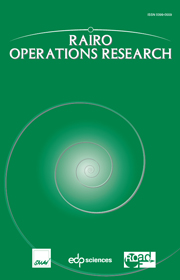Article contents
Inequality-sum: a global constraint capturing the objective function
Published online by Cambridge University Press: 15 October 2005
Abstract
This paper introduces a new method to prune the domains of the variables in constrained optimization problems where the objective function is defined by a sum y = ∑xi, and where the integer variables xi are subject to difference constraints of the form xj - xi ≤ c. An important application area where such problems occur is deterministic scheduling with the mean flow time as optimality criteria. This new constraint is also more general than a sum constraint defined on a set of ordered variables. Classical approaches perform a local consistency filtering after each reduction of the bound of y. The drawback of these approaches comes from the fact that the constraints are handled independently. We introduce here a global constraint that enables to tackle simultaneously the whole constraint system, and thus, yields a more effective pruning of the domains of the xi when the bounds of y are reduced. An efficient algorithm, derived from Dijkstra's shortest path algorithm, is introduced to achieve interval consistency on this global constraint.
- Type
- Research Article
- Information
- Copyright
- © EDP Sciences, 2005
References
- 6
- Cited by




